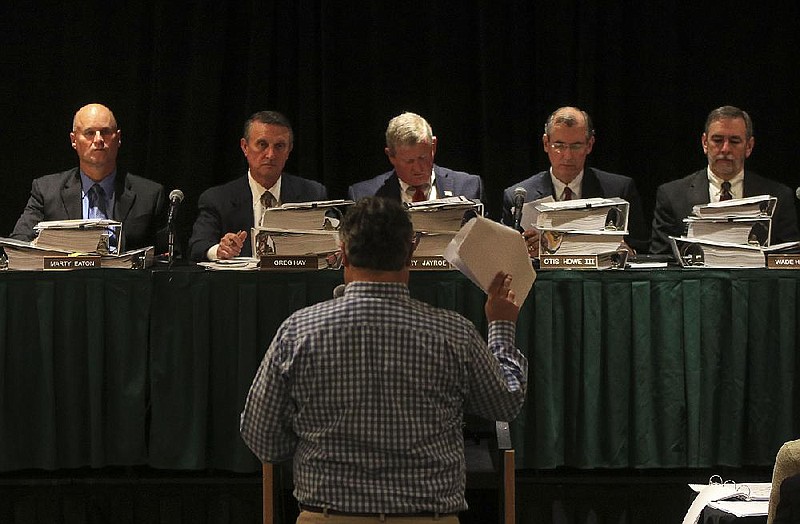The state Plant Board met Friday for the first time since May with barely enough members to form a quorum or take any official action after a Pulaski County Circuit Court order in June that forced the removal of nine board members appointed by Gov. Asa Hutchinson.
Arkansas law stipulates that the Plant Board should have 19 members, and of that number, a majority of the remaining members must be present for a quorum and to take any official action, Wade Hodge, state Department of Agriculture managing attorney, said at Friday's meeting.
That means all remaining Plant Board members must be present at each meeting.
It's unclear how long the board will proceed with nine unfilled seats, though some movement could be made during the next state legislative session in January, Hodge said.
There are currently eight voting members and two nonvoting members on the Plant Board -- the two represent the University of Arkansas System Division of Agriculture but don't have voting privileges -- so at least five of those eight voting board members need to vote for any measure to pass, Plant Board Chairman Matthew Marsh said Friday.
"We still have 10 members of the board of the 19 members to have a quorum, so 10 will give us a majority and then of those members, we have to have a majority of the voting members to pass any resolution or take up any business, so of the eight voting members, we would have to have five votes to pass anything," Marsh said.
The board was advised that a recusal would not allow the board to have a quorum, and an abstention would allow the board to maintain a quorum, but five votes would still be needed to pass any measures, Marsh said.
Plant Board meetings in recent years have included complaints about damage to crops, mostly soybeans, that aren't resistant to the herbicide dicamba. Two farmers at Friday's meeting spoke out against the effects of dicamba on their crops and of potential health hazards caused by the weedkiller. The Plant Board took no official action related to the testimony, though a couple members expressed similar frustrations and sympathy for farmers.
The state had 360 complaints of dicamba damage in 2021, with dicamba since then confirmed as the suspect herbicide in 266 cases. That compares with 137 cases of confirmed dicamba damage in 2020.
Weed scientists in Arkansas and other states say formulations of dicamba have a tendency in summer heat and humidity to move off target hours or days after application.
Some farmers who plant dicamba-tolerant soybeans and cotton claim dicamba is their only defense against pigweed, an invasive plant that has mutated and has become resistant to other herbicides.
The Plant Board sets the dates that dicamba spraying can start and when it must end for each growing season. It last officially convened in May.
There were 16 board seats filled when the Plant Board met in March, a special called meeting in April, as well as a few committee meetings, Marsh said.
Officials said in May that three appointments were made to the board to bring the number to 19: Cameron Stone representing the Arkansas Oil Marketers Association, Darin Owens representing the Arkansas Seed Growers Association and Sam Stuckey, who was reappointed to represent cotton growers.
Officials also said the term of Darrell Hess, who represented the Arkansas Plant Food Association, had expired in March, but he would continue serving on the board until he was reappointed or replaced.
The selection process for Plant Board members that had been in place for 104 years was invalidated in May 2021 by the Arkansas Supreme Court in McCarty v. Arkansas State Plant Board. The court found that lawmakers had given up too much power to business interests to staff the board.
Even before the high court ruled, the General Assembly had taken action to replace the initial selection process with Act 361 of 2021.
On May 17, Pulaski County Circuit Judge Morgan E. "Chip" Welch ruled that the Arkansas Legislature in Act 361 had illegally ceded control of the state Plant Board to private business interests and he invalidated the board member selection process and the membership of the nine members appointed by Gov. Hutchinson.
The nine members who were removed were selected by trade groups as set out by Act 361. The method requires the groups to nominate two candidates each, one of whom is chosen by the governor for board membership, subject to Senate confirmation.
In his order, Welch said the appointment process is an "unconstitutional delegation of public power to private interests" in violation of the state Constitution. He cited the state Supreme Court's opinion in 2021.
The lawsuit before Welch was brought by plaintiffs FarmVoice Inc., Adam Henard, Jared Hopper & Timothy Pirani. FarmVoice is a nonprofit corporation based in Crittenden County representing Arkansas row crop farmers and pesticide applicators, and the three individual plaintiffs are Mississippi County soybean and rice farmers.
FarmVoice was formed, in part, to promote for the expanded use of dicamba. The herbicide is not harmful to crops that have been modified to withstand the chemical. But farmers have complained for years that dicamba can drift from the fields where it is sprayed and damage nearby crops, trees and gardens that are not tolerant, according to the USDA.
Information for this article was contributed by John Lynch of the Arkansas Democrat-Gazette.
